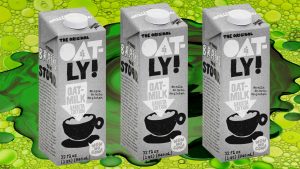Oatly oat milk is a non-dairy substitute for traditional milk that has gained significant popularity in recent years. You might have encountered someone ordering a “matcha latte with oat milk” at your local coffee shop, and you’ve probably wondered whether this trendy beverage is actually healthy. In this detailed analysis, we’ll delve into the ingredients and nutritional content of Oatly oat milk to help you make an informed decision about including it in your diet.
Ingredients in Oatly Oat Milk
The primary ingredients in Oatly oat milk include water and oats. Additionally, it contains rapeseed oil, dipotassium phosphate, calcium carbonate, calcium phosphate, sea salt, vitamin B12, riboflavin (B2), vitamin D2, and vitamin A.
Nutritional Facts per 1 Cup (240 ml) of Oatly Oat Milk
Let’s break down the nutritional content of one cup (240 ml) of Oatly oat milk:
- Calories: 140
- Fat: 7 g
- Saturated Fat: 0.5 g
- Trans Fat: 0 g
- Cholesterol: 0 mg
- Sodium: 100 mg
- Potassium: 390 mg
- Total Carbohydrates: 16 g
- Dietary Fiber: 2 g
- Soluble Fiber: 1 g
- Sugars: 7 g (including 7 g of added sugars)
- Protein: 3 g
Hidden Sugars in Oatly
One surprising aspect of Oatly oat milk is that it contains 7 grams of added sugar per cup, despite not listing any added sweeteners in the ingredients. This discrepancy raises questions about the source of this added sugar. It turns out that Oatly’s production process involves the use of added enzymes to break down oat starch into simple sugars, primarily maltose. Maltose has a glycemic index of 105, making it extremely impactful on blood sugar levels. To put it into perspective, this impact is even higher than that of white flour and doughnuts, which have glycemic indices of 85 and 75, respectively. In essence, a 12-ounce glass of Oatly oat milk has a blood sugar impact similar to that of a 12-ounce can of soda.
Oatly’s Oil Content
Another notable aspect of Oatly oat milk is its oil content. It contains rapeseed oil, which is essentially the same as canola oil but under a less appealing name. Both rapeseed and canola oils are highly processed and are considered inflammatory and unhealthy due to their trans-fat content, which can reach up to 2.03%. Trans-fats have no safe level of consumption and have been officially banned in the United States. In terms of quantity, an 8-ounce cup of Oatly oat milk contains as much oil as a medium serving of french fries. So, if you order a large latte with Oatly, you’re essentially consuming more oil than you would in a serving of large fries.
Questionable Additives
Beyond the oil content, Oatly oat milk includes dipotassium phosphate as an ingredient. This food additive, once derived from animal bones and urine, is now extracted from phosphate rock and subjected to chemical processes to make it suitable for consumption. Foods that often contain added phosphates include processed meats, sodas, fast food, and frozen chicken nuggets. While the FDA currently considers phosphates to be generally recognized as safe (GRAS), it’s worth noting that this regulatory body has a history of lagging behind scientific research. In the case of trans-fats, for example, the FDA did not take action until 2015, despite evidence dating back to the 1990s indicating their harmful effects. Some studies have raised concerns about the health impact of added phosphates, particularly their potential harm to kidney health, in a country where chronic kidney disease is a leading cause of death and disability.
Vitamin Fortification Choices
To make its oat milk more nutritionally comparable to traditional cow’s milk, Oatly fortifies its product with added vitamins and minerals. While this is a positive step, it’s worth noting that they use Vitamin D2 instead of the more effective Vitamin D3. Vitamin D3 is naturally produced by your skin when exposed to sunlight and is nearly twice as effective as Vitamin D2 at raising Vitamin D levels in the blood. Oatly’s choice of Vitamin D2 may be driven by the desire to keep their product 100% vegan, but it means that consumers may not receive the full benefits of Vitamin D supplementation.
Conclusion
While Oatly oat milk may present itself as a healthy, plant-based alternative to dairy milk, a closer examination of its ingredients and nutritional content raises concerns. It contains hidden sugars that have a significant impact on blood sugar levels, a substantial amount of processed rapeseed oil, and potentially questionable additives. Additionally, the choice of Vitamin D2 over Vitamin D3 may compromise the nutritional benefits of the product.
Despite Oatly’s marketing claims to promote a plant-based diet and improve lives, it’s important to consider these nutritional factors when incorporating this oat milk into your diet. Making informed choices about the foods and beverages you consume is crucial for your overall health and well-being.
This article has been inspired by a post from: Jeff Nobbs Blog. This link also contains an official explanation by Oatly












